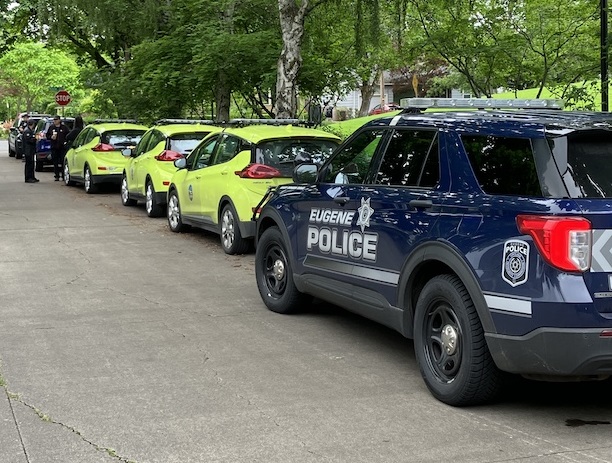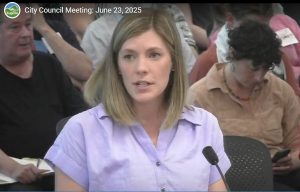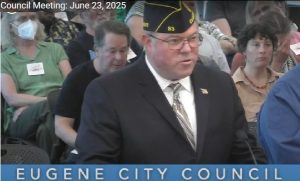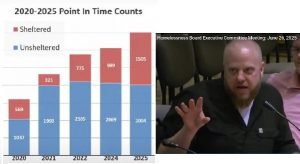Coercive compassion
4 min read
by Ted Coopman
In a tense and tragic scene, a half-dozen Eugene police officers and three Parking Services staff stand outside an inoperable RV parked with two wheels on the curb in front of a home near Monroe Park. A tow truck idles nearby. The police knock and inform the occupants they need to gather any belongings and exit the vehicle. Tears and expletives are unleashed as a young woman cries out “you’re taking my home!”
Such a scene would anger homeless advocates and sicken the compassionate. Towing away someone’s shelter, even if it is a broken-down RV, seems cruel. But to understand how we arrived at this point, it is crucial we complicate our view and put it in context. It is exemplary of the challenges that face mostly West Eugene neighborhoods as our homeless crisis grinds on.
This inoperable RV was towed around by a small pick-up truck. It was “known” to authorities as evidenced by the multiple orange warning stickers fixed to its window. It was also known to neighbors, as it appeared in front of homes, spilling its contents onto parking strip and street, and hosting parties and “bike repair” late into the night. It would sit in front of homes for a week or more as complaints added it to a long queue for service, then verification, then notification, and finally an orange tag. Before a citation or a tow truck arrived, it would get moved and the whole process would repeat.
If they had not made the mistake of parking on the curb (a towable offense) instead of merely exceeding the 72-hour limited or being an RV parked next to residences overnight, it would likely still be haunting the neighborhood. It was but one of a fleet of RVs, converted buses, and trailers that circulate around West Eugene.
The current system of repeated warnings does not work, because these willful violators simply move before they get cited and, like Groundhog Day, the whole process starts again. Repeatedly seeing these vehicles (many with out-of-state plates) and neighbors spending time reporting the same vehicles is disheartening and frustrating. Each time the “clock” restarts, and neighbors must endure the impacts of noise, trash, often harassment, and dangerously obscured line of sight.
It is ridiculous, and a waste of city resources and neighbor time, that each time a camper relocates (leaving neighbors to clean-up), it is as if they had never been warned. These folks know the rules and how to game the system. And as the city avoids the expense and selective outrage, it victimizes rent and mortgage paying residents.
Homelessness is a collective challenge. However, the impacts of homelessness and the resulting illegal camping is not shared, and falls disproportionately on poorer neighborhoods, often majority renters, in West Eugene. The sad truth is that renters and poor people are less likely to know their rights and how and where to complain.
Disturbingly, if you report someone using your parking strip as their front yard/dump/toilet the city will tell YOU to ask them to move or that YOU can simply move their things into the street! Again, this shifts all responsibility to the public and those unaware of their rights and where to get redress, or are simply afraid, bear the brunt. Displaced campers regularly retaliate against residents and business – they literally know where you live. Woke-adjacent compassion junkies in wealthier neighborhoods pressure city leadership which seem content to placate them at our expense. When neighbors and businesses push back, we are tarred as cruel NIMBYs.
Having someone living on your curb and using your yard as a toilet is not conducive to compassion. We had plenty of compassion. It was just beaten out of us.
The consequences for this inequity, where the poor, renters, and small and medium-size West Eugene businesses pay for the wealthy’s compassion performance, are significant. Homeowners sell; renters relocate if they can; business leave town or are forced to spend money on hardening their facilities or hiring security; and churches and nonprofits waste precious time and resources protecting their facilities and staff instead of providing for the less fortunate.
While we must address the scourge of homelessness, it is not a suicide pact that demands we tolerate abusive, dangerous, often illegal, and, yes, trauma-inducing behaviors by a relatively small, belligerent segment of the unhoused population. The residents and business in West Eugene also have rights—to be safe and secure, to have their property respected, and to not have to sneak out of their homes to avoid being screamed at or to signal no one is home.
We need compassion, but we also need order on our streets, and no individual, neighborhood, or business should be sacrificed for a collective problem.
Ted Coopman is a resident of West Eugene and chair of Jefferson Westside Neighbors.



